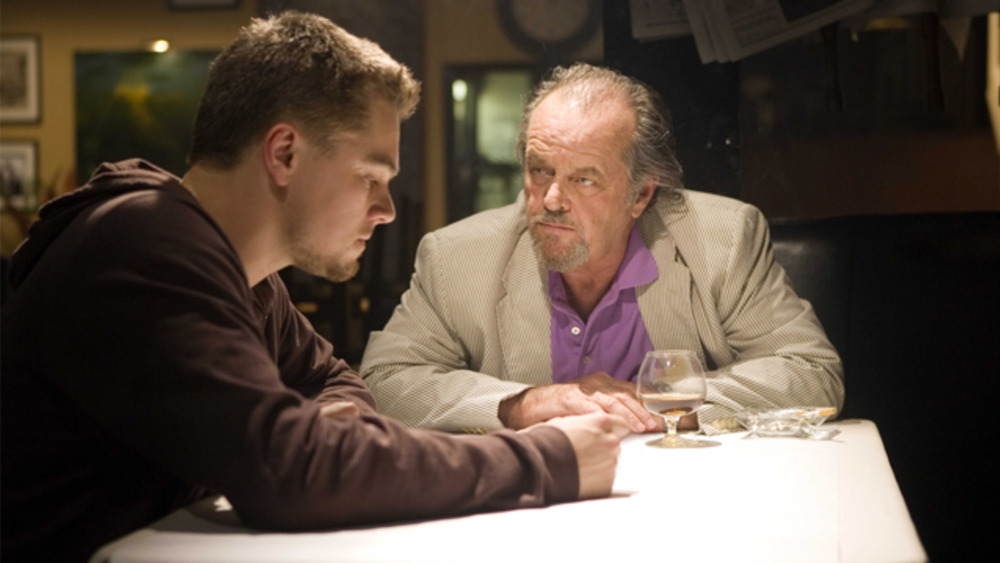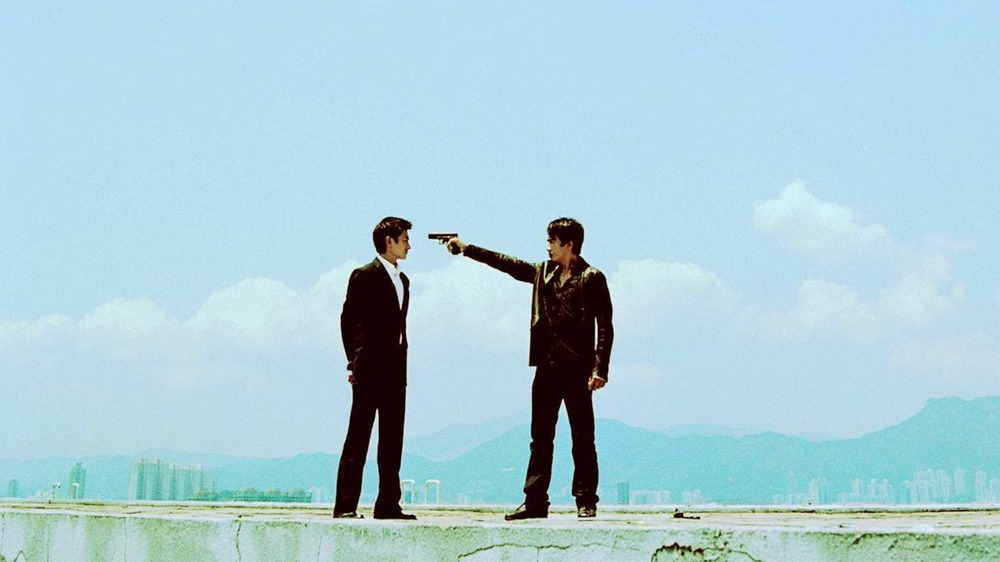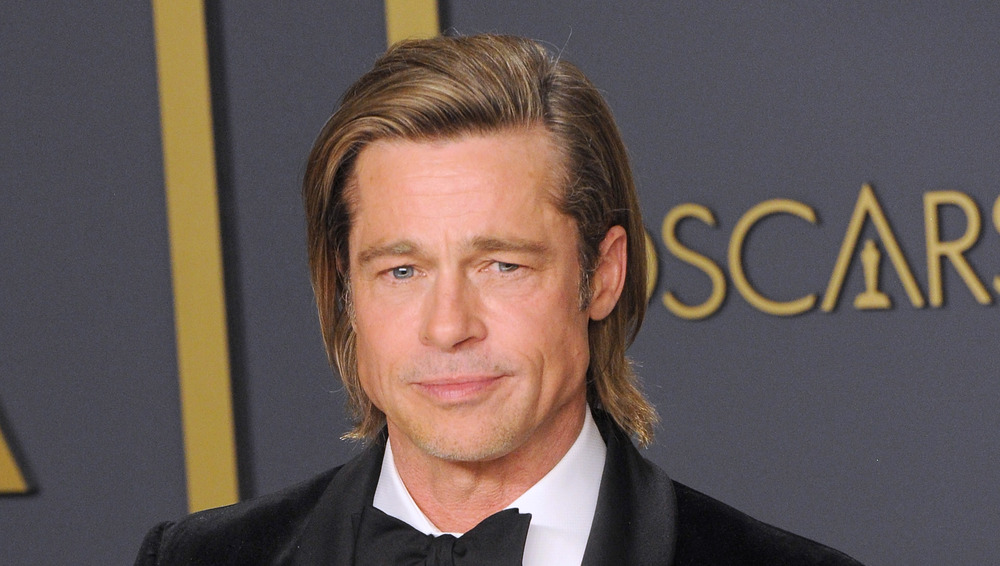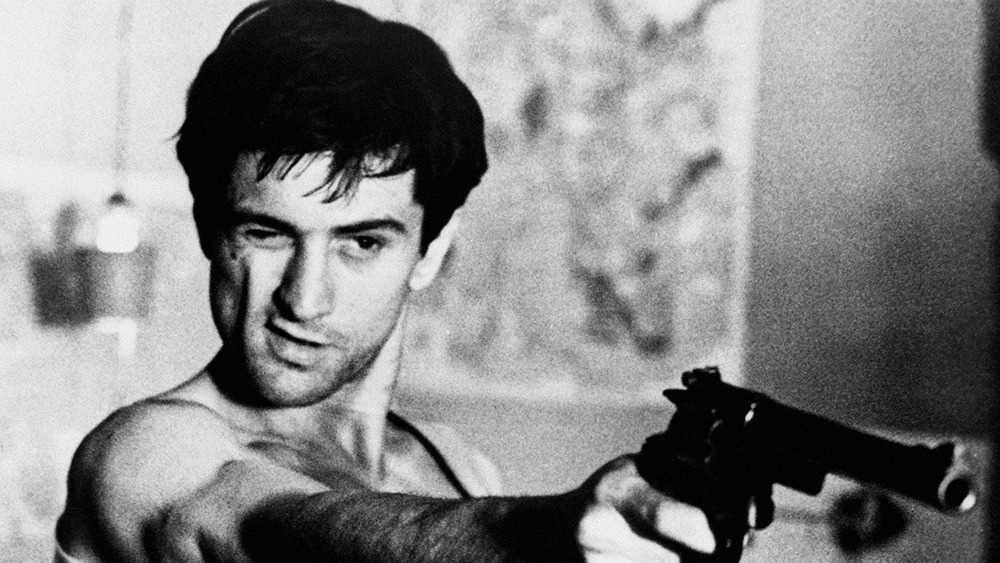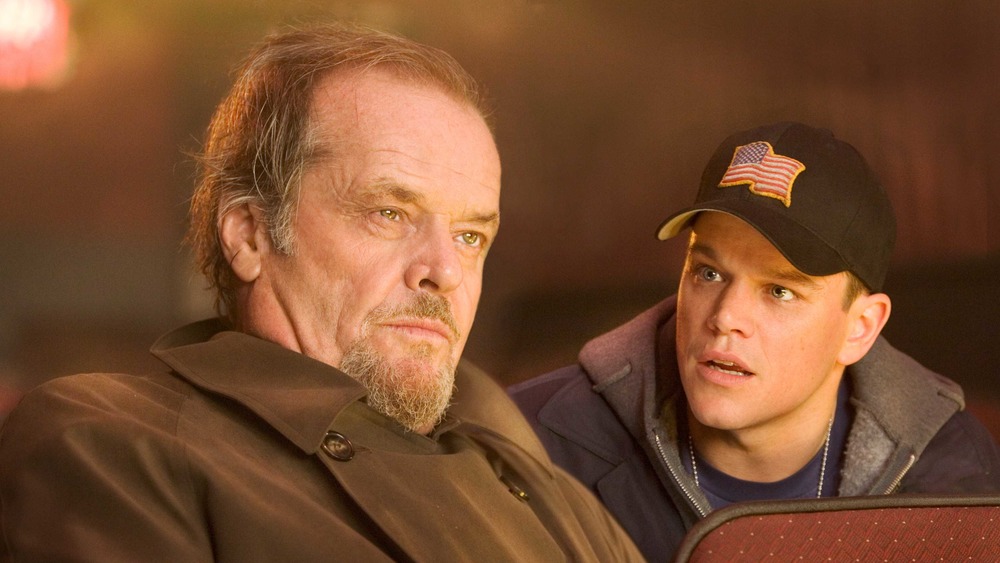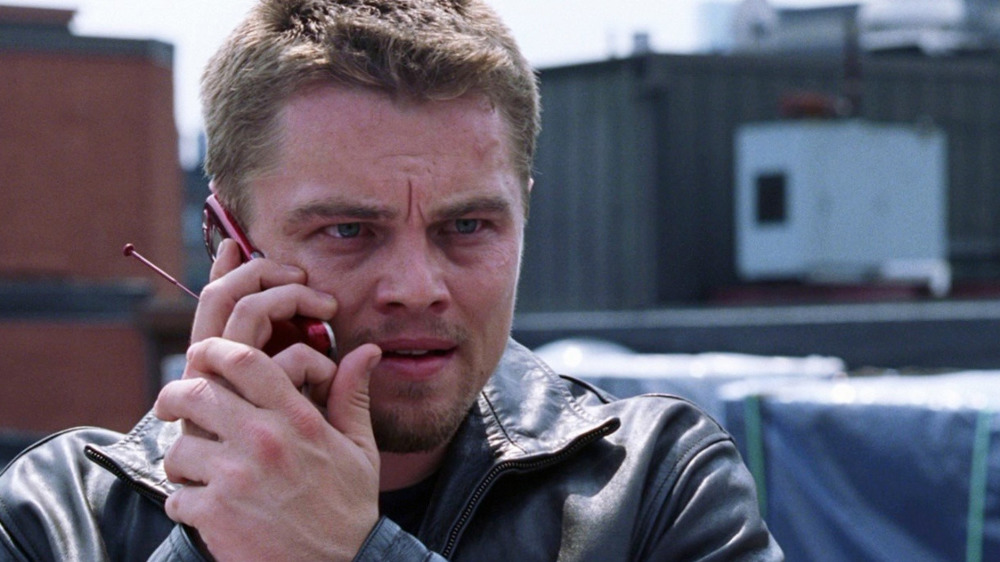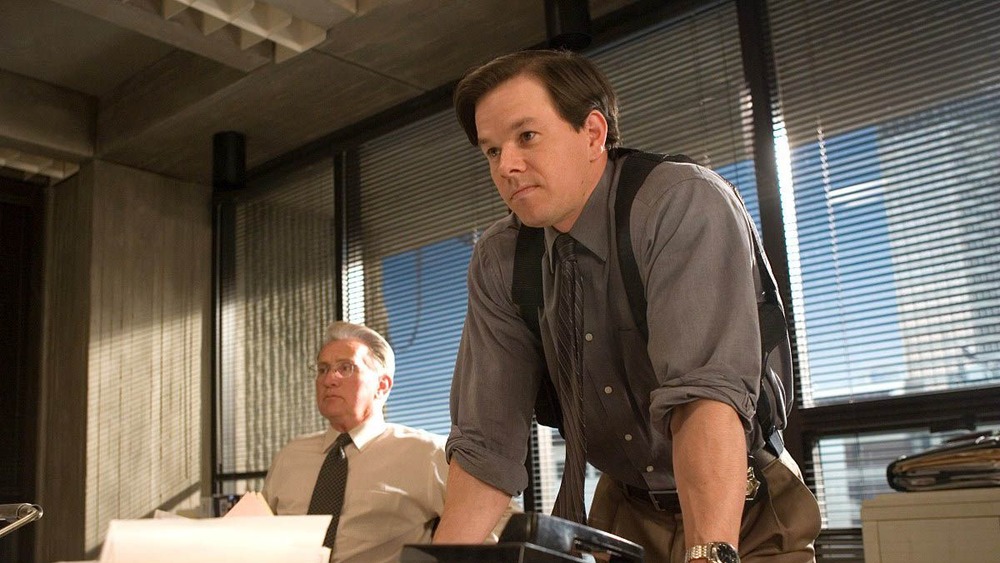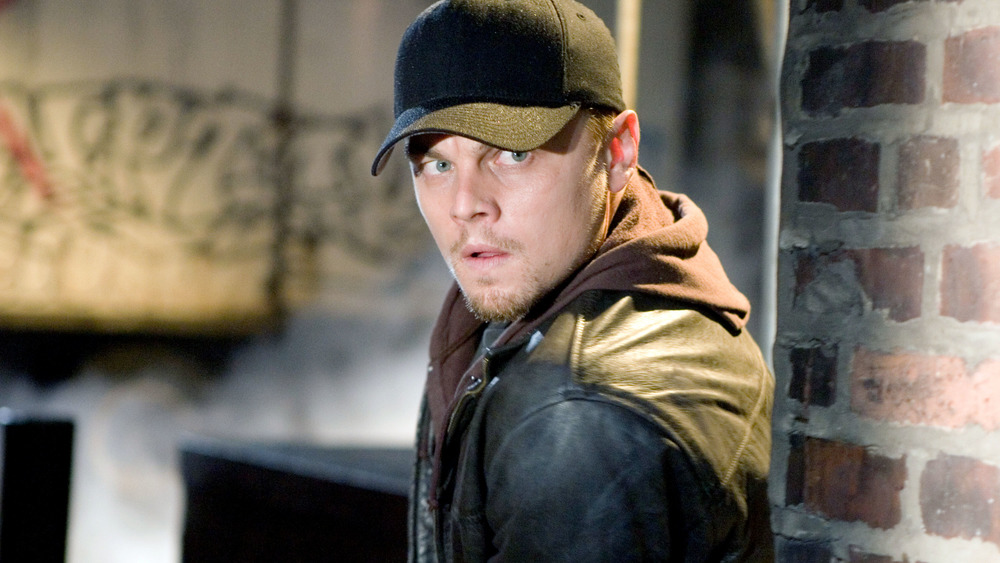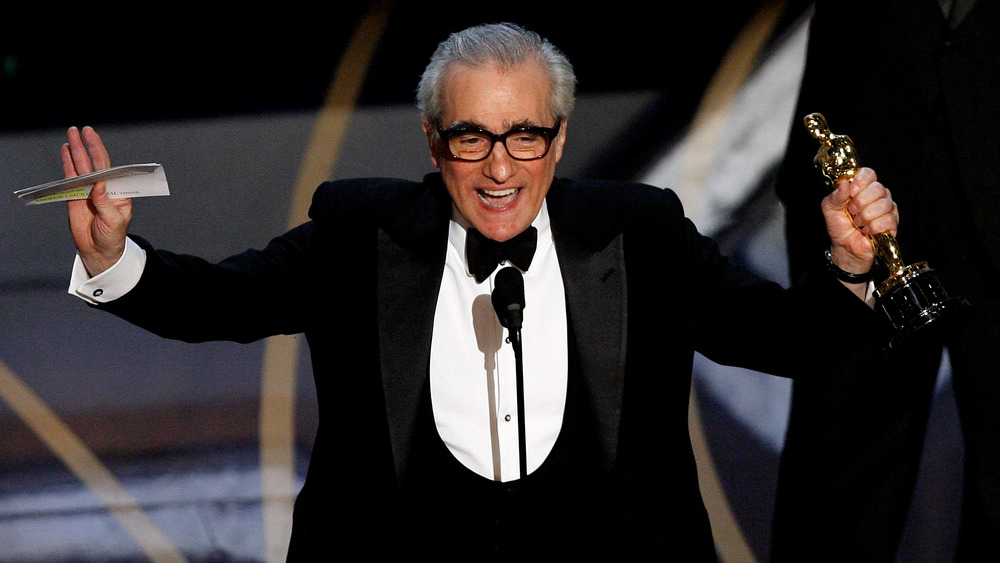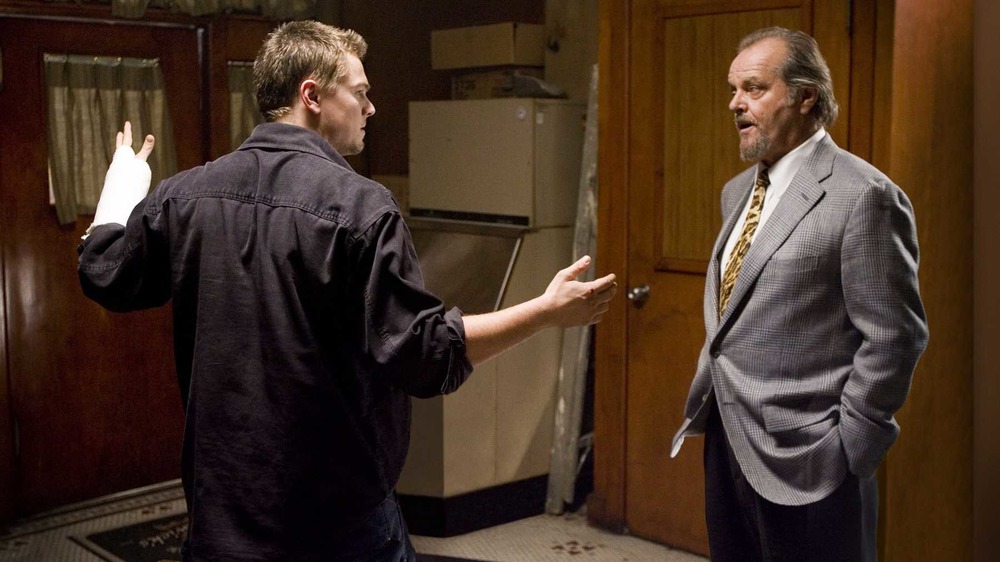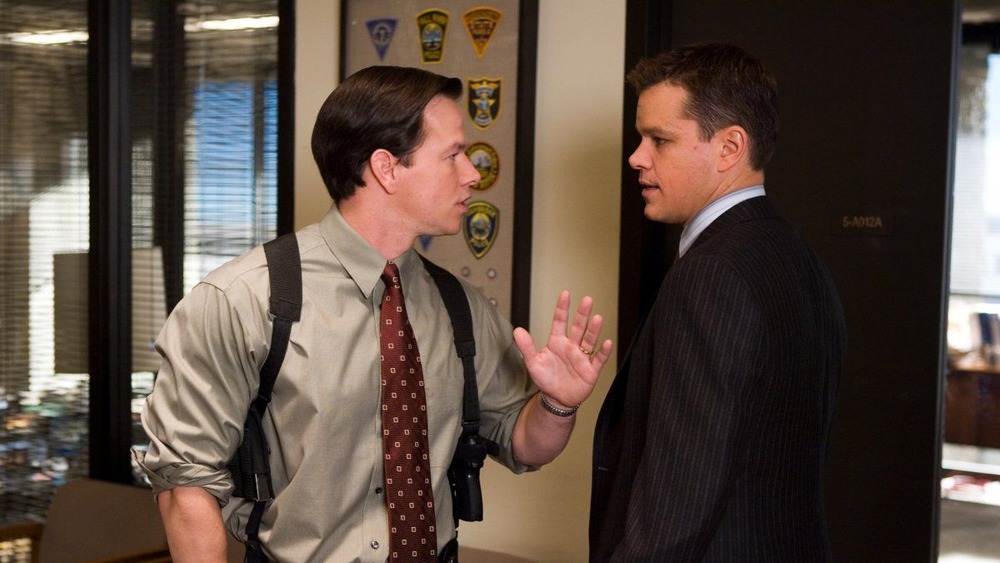The Untold Truth Of The Departed
Martin Scorsese has made many voyages into the world of gangsters, but none of them have been as lucrative, either financially or in terms of award season success, as The Departed. Released in September 2006, The Departed chronicled the exploits of two cops working for crime boss Frank Costello (Jack Nicholson). One, Billy Costigan (Leonardo DiCaprio), is a mole working for the Massachusetts State Police. Meanwhile, Colin Sullivan (Matt Damon) is working the opposite game as an inside man in the Massachusetts State Police for Costello. It's a movie packed with double-crosses, suspenseful sequences that leave you breathless and a stacked cast (Mark Wahlberg and Ray Winstone are just two notable supporting players) delivering resoundingly memorable work. No matter what you like in your crime movies, The Departed is bound to deliver the goods.
No wonder, then, that The Departed became a box office smash and an Oscar winner for Best Picture. Though it's been nearly 15 years since it first hit theaters, it's no surprise that a work as detailed as The Departed is still revealing new aspects about itself, from hidden visual motifs to real-life people who inspired pivotal parts of its story to the ways it hit new landmarks for Scorsese in his esteemed career. Through these elements, it becomes apparent that The Departed is a film both rich with history and rich in its impact on history.
The Departed is a remake
In 2002, the action movie Infernal Affairs debuted in Hong Kong cinemas. Hailing from directors Andrew Lau and Alan Mak, it proved to be an extremely popular crime drama that scored numerous prestigious award wins at ceremonies like the Golden Horse Awards. Eventually, all of the acclaim for Infernal Affairs spilled far outside of Hong Kong. Not only did it garner further acclaim in other countries, but Infernal Affairs was eventually selected by Empire as one of the greatest pieces of world cinema ever created.
With all this praise, it was inevitable that Infernal Affairs would follow the path of countless other acclaimed foreign-language titles and receive an American remake. In February 2003, Warner Bros. purchased the remake rights to Infernal Affairs, with the film's plot being seen as a perfect fit for the studio that had previously released titles like Heat and Training Day. At the time, Scorsese was not involved with the project — only producers Brad Grey and Brad Pitt were. The project would eventually morph into Scorsese's The Departed, which may not even be the last remake of Infernal Affairs. In 2017, plans were announced for a Hindi remake of the same Hong Kong action film.
Brad Pitt was originally set to star
Brad Pitt was entangled with The Departed from the very instant it was getting off the ground. When Warner Bros. first purchased the American remark rights to Infernal Affairs, Pitt was attached to the project as a producer. Given his involvement in crime films like Seven and Snatch, Pitt was a solid choice to participate in an American version of Infernal Affairs. Subsequently, the announcement that Scorsese had come aboard to direct the production also brought news that Pitt would not just produce the movie, but would star in it alongside Leonardo DiCaprio. Unfortunately, audiences would have to wait until Once Upon a Time in Hollywood to see DiCaprio and Pitt headline a movie together.
Though The Departed features countless famous faces, Pitt isn't one of them. The actor later revealed to Interview Magazine that he voluntarily stepped away from acting in The Departed due to age-related concerns. "Once [Martin] Scorsese became involved, I thought it would be better if they were younger guys that were just starting their lives," Pitt explained. "Guys coming out of the academy, guys who were hungry. I thought I was too old for it." Though he didn't join its cast, Pitt stayed on as a producer of The Departed, a role that allowed this Scorsese picture to become the first film from Pitt's production company, Plan B Entertainment, to score a Best Picture nomination.
Robert De Niro almost appeared in a supporting role
Scorsese has used a handful of recurring actors across his filmography, but none of them are as prolific as his ongoing collaborations with Robert De Niro. Dating back to the 1973 mobster movie Mean Streets, De Niro and Scorsese have been an unstoppable pair. "There have been masterful Scorsese movies without De Niro, and brilliant De Niro performances without Scorsese," reflected Erik Kohn of IndieWire. "But they retain a sacred power imbued in the elusive bond between the filmmaker and his subject." Such a bond has been on full display in Scorsese movies like The King of Comedy, Taxi Driver and Goodfellas. For one brief moment, it looked like that Scorsese/De Niro magic would also be included in The Departed.
Scorsese apparently approached De Niro to take on the role of Captain Oliver 'Charlie' Queenan in The Departed. If De Niro had accepted, it would have been their first time working together as director and actor since the 1995 movie Casino. However, De Niro had to decline the role so that he could direct his 2006 movie The Good Shepherd. Martin Sheen ended up taking on the part of Queenan, while another De Niro/Scorsese collaboration would have to wait until the 2019 film The Irishman. Although De Niro had to opt out of The Departed, that occurrence has been the exception rather than the rule when it comes to one of the most iconic filmmaker and actor pairings in history.
Jack Nicholson's character was based on a real-life mobster
The 2002 film Infernal Affairs isn't the only place The Departed takes creative inspiration from. While Jack Nicholson's gangster character Frank Costello takes his name from a New York mafia boss, the character's position as a prolific crime figure in Boston, Massachusetts can't help but conjure up visions of real-life Boston crime legend Whitey Bulger. Bulger's real-life relationship to the FBI is evoked by having multiple members of the Massachusetts State Police be a part of Costello's gang. Just as Bulger kept his enemies in law enforcement close, so too does The Departed's Costello.
Merging a fictitious criminal with a real-life mobster proved a tantalizing concept, even to Bulger himself. The infamous criminal was so intrigued by a Scorsese film taking creative inspiration from his own life that he ended up watching the movie. In talking about their book Hunting Whitey: The Inside Story of the Capture & Killing of America's Most Wanted Crime Boss, authors Casey Sherman and Dave Wedge revealed that Bulger, while on the lam, snuck into a movie theater and watched The Departed. According to a sheriff's deputy who spotted the former crime boss in the theater, Sherman explained, "Bulger shook his head in disgust many times while watching Jack Nicholson's fictional version of him on the big screen." Even if Bulger didn't approve, the widespread acclaim for The Departed indicates it did something right in its Bulger-inspired crime story.
The Departed is influenced by post-9/11 America
The horrors of the September 11, 2001 attacks left such a massive impact on American culture that it was inevitable that the country's filmmakers would respond to the new status quo through their work. For instance, Steven Spielberg's post-9/11 movies have been widely interpreted as offering commentary on the new world America was navigating. Similarly, fellow iconic filmmaker Martin Scorsese offered his own perspective on a post-9/11 world with The Departed.
Writing for RogerEbert.com, Niles Schwartz observed that The Departed's "mid-film blue sky rooftop murder...with its flabbergasted police radio babble, echoes the horror and confusion of 9/11." Meanwhile, Andrew Sarris of The Observer saw the influence of 9/11 in The Departed in more than just one scene. To Sarris, The Departed carries "an atmosphere of perpetual paranoia so characteristic of our post-9/11 world. No one can completely trust anyone else."
Scorsese himself has opined on how The Departed reflects a post-9/11 world, particularly in regards to that final famous shot of a rat scurrying across the screen. "[The rat] also represents that for me as the film developed a sense of paranoia and betrayal and one person never knowing who the other person is," Scorsese explained to CanMag. "It kind of reflects the world now, the America that we know now, post-September 11th." Navigating that new world can be difficult, but films like The Departed help us to process it.
The letter X plays heavily into the movie
The Departed is a movie that isn't afraid to use overt symbolism to make a point. Just look at that divisive ending shot involving a rat scurrying across a balcony. A more subtle example of symbolism in The Departed comes through a visual motif in the form of the letter X, which appears in various forms throughout the movie. These X's are always in the background and never shoved into the audience's faces. One site reports at least 15 different instances of X's emerging throughout the runtime, including X's on the windows during a death sequence for the character of Queenan and in the architecture of an airport walkway.
What do all these X's mean? According to The Miami Herald, it functions as a homage to the foundational gangster genre title Scarface from 1932. However, it also functions as a way to signal "impending doom" in the movie's universe. Nearly everyone in this movie is destined for a grisly ending — it's the cost of engaging with such a seedy gangster world. The X's hovering around The Departed's characters quietly remind viewers of this fact. This visual manifestation of humanity's fragile mortality makes this motif a precursor to the thematically similar on-screen text in The Irishman clarifying how mobsters will die. The X”s in The Departed are also simply another example of how the movie packs in so many thoughtful details without the viewer even knowing it.
A former detective influenced the film
Even esteemed actors like Leonardo DiCaprio can't generate memorable performances out of thin air. Research into the worlds you're meant to be portraying can provide great groundwork for actors when it comes to bringing their characters to life. In the case of The Departed, the movie's lead actors drew inspiration from a real-life figure who could attest to the toll of being a detective.
Former Boston detective Tom Duffy provided ample amounts of help with tapping into the realities of the Boston crime scene. "We had a great technical advisor named Tom Duffy who was there throughout the entire filmmaking process," DiCaprio revealed to MovieWeb. "He knew the entire history of Boston and knew what the streets were like." Matt Damon revealed in the same interview that he also received valuable insight from Duffy. "As Leo said, Tom Duffy was a huge resource," Damon explained. "Duff was able to get me around a bunch of police. It was really fascinating."
With Duffy's expertise leading the way, DiCaprio and Damon were able to take their performances to the next level of authenticity. There's a lived-in quality to how both DiCaprio and Damon's characters grapple with the duplicity they live with on a daily basis. That quality wouldn't register as well as it does in the finished film without the aid and knowledge of Tom Duffy.
The film hit new box office highs for Scorsese
Despite being one of the most acclaimed directors ever to walk the Earth, Martin Scorsese's movies haven't always been massive box office hits. Even a film like his 1990 masterpiece Goodfellas made just $46.8 million, a sum that put it behind long-forgotten 1990 titles like Look Who's Talking Too. Despite Scorsese being responsible for some of the greatest movies of all time, it's not surprising his works aren't regular box office smashes. With their grim tones and frequently challenging subject matter, Scorsese's works haven't always been the kind of crowdpleasers that bring in moviegoers. The Last Temptation of Christ and Silence would never become box office sensations no matter who was directing them.
However, Scorsese's box office trajectory sharply turned around when The Departed hit movie theaters in September 2006. With a $132.3 million domestic haul, The Departed was a box office hit on a number of levels. For one thing, it was only the second Scorsese movie (following The Aviator) to crack $100 million domestically. It also became the 15th biggest movie of 2006 domestically and DiCaprio's second biggest movie (only behind Catch Me If You Can) since Titanic. The allure of its big-name cast and the reputation Scorsese had cultivated over four decades of filmmaking turned The Departed into an event like few of the director's previous movies. In the process, The Departed became as much of a financial win for Scorsese as it was a critical one.
The Departed gave Scorsese his big Oscar wins
From his acclaimed directorial efforts to his extensive efforts in preserving old films with his Film Foundation, Martin Scorsese's positive impact on the medium of cinema is immeasurable. Considering that, it's shocking that it took four decades before one of his movies secured a Best Picture Oscar. Somehow titles like Taxi Driver, The Last Temptation of Christ and Goodfellas managed to get snubbed for Best Picture wins or even in some cases nominations.
However, Scorsese's cold streak finally came to a decisive close at the 79th annual Academy Awards with The Departed. In addition to wins for Best Adapted Screenplay and Best Editing (the latter award going to Scorsese's regular editor Thelma Schoonmaker), The Departed managed to become the first Martin Scorsese movie to win a Best Picture Oscar. Producer Graham King accepted the award and used his acceptance speech to thank the entire cast and crew while noting his luck in getting the chance to watch Scorsese direct Jack Nicholson. Meanwhile, earlier in the night, Scorsese took home a Best Director trophy, to date his only Oscar win in that category after six previous losses.
"I'm overwhelmed with this honor with the Academy and also the honor of being presented by my old, old friends," Scorsese reflected in his acceptance speech after being presented with the award by Steven Spielberg, George Lucas and Francis Ford Coppola. "We go back thirty-seven years. I'm so moved. I'm so moved."
There was almost a Departed sequel
Martin Scorsese has done many things in his career. A musical. Dark comedies. Religious-themed projects. But something he's avoided is sequels. Yet in the wake of The Departed being an out-and-out box office hit, it was inevitable that talk of a follow-up would emerge. It also helped that The Departed's source material, Infernal Affairs, spawned several sequels, which could provide creative inspiration for any potential Departed follow-ups.
At the start of 2007, it was revealed that Warner Bros. was interested in developing not just a sequel but an entire trilogy for The Departed. Mark Wahlberg expressed interest in returning for any potential Departed sequels in the summer of 2008, while screenwriter William Monahan revealed in October 2011 that his idea for The Departed 2 took place "before, during and after the action" of the original movie. At the same time, Monahan expressed doubt that the project would ever get off the ground due to budget concerns from Warner Bros. These concerns were brought up again in February 2016, when producer Roy Lee revealed to Collider why The Departed 2 fizzled out. In addition to confirming that the sequel involved characters who had died in The Departed, Lee explained that the sequel was doomed due to the expensive costs of the project as well as Scorsese's reluctance to return to the material.
